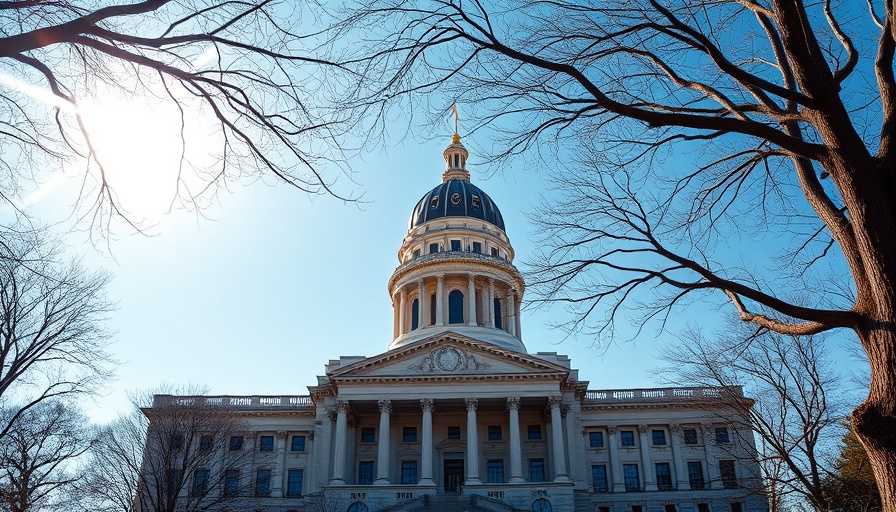
Michigan's Tax Battle: A Divided Legislature's Approach
The landscape of Michigan’s taxation policy is shifting as lawmakers vigorously debate competing plans aimed at income tax reductions. Recently, the Michigan House approved a modest cut to the flat income tax rate, moving from 4.25% to 4.05%. This decision was made amidst a heated legislative session where opinions on fiscal responsibility and tax fairness clash significantly.
Understanding the Proposed Tax Cuts
The approval in the House, where a coalition of Republicans and a few Democrats rallied in favor, is projected to save the average household about $131 annually. Yet, the savings might feel trivial, especially when contrasted with the backdrop of rising living costs. Critics have voiced concerns that such cuts disproportionately favor the wealthy, leaving lower-income residents largely untouched.
Rep. Morgan Foreman from Ann Arbor referred to the tax cut as "a wolf in sheep’s clothing," highlighting that approximately 64% of benefits would support the wealthiest Michiganders. This sentiment reflects the broader argument that systemic changes are needed rather than temporary palliative measures. The proposal is also under fire due to its potential fiscal repercussions, with estimates indicating a loss of over $700 million in state revenue annually, a figure that could lead to budgetary tightening in essential services.
The Senate's Alternative: Focus on Families
In stark contrast, Senate Democrats are advocating for a suite of subsidies aimed at supporting working families and new mothers, a plan touted as more equitable than across-the-board tax cuts. This divergence illustrates the ideological split within the Michigan legislature: while one side seeks broad tax relief, the other prioritizes targeted assistance designed to address the needs of vulnerable citizens.
Senate Majority Leader Winnie Brinks has emphasized the importance of support structures for families, stating that the proposal is about investing in Michigan’s most needy residents, reflecting a commitment to economic inclusivity.
Historical Context and Future Predictions
Michigan's taxation policies have undergone numerous changes over the years, notably fluctuating as political control shifted between parties. The proposed cut references a moment in 2023 when the tax rate temporarily dropped due to favorable budget conditions. But courts deemed the drop unsustainable, illustrating the complex relationship between tax policy and the state’s long-term fiscal health.
Looking ahead, legislators and analysts alike suggest that stability in tax laws is crucial for economic growth. Such alterations not only impact the immediate fiscal landscape but also influence investment decisions by businesses and families looking to settle in Michigan.
Counterarguments Abound
Opponents of the income tax cut raise pertinent questions regarding the future sustainability of essential services. Focused on local needs like water infrastructure, activists are advocating for a more balanced budget approach that does not sacrifice long-term community health for short-term relief.
"What will be funded in the future? Will we see cuts to vital areas like education or infrastructure maintenance?" asked local activist Nichole Keway Biber. Her perspective underscores a critical tension in budget decisions: the balance between immediate tax relief and the long-term consequences of underfunding public investment.
Public Sentiment and Engagement
As Michiganders confront rising costs of living, public interest in these debates has intensified. Polls indicate that while many residents support tax cuts, there is a palpable concern about the loss of funding for crucial services. This multifaceted issue resonates particularly with communities that have felt the impact of previous budget cuts.
Moreover, the nuances of tax policy are complicated by regional disparities. Urban areas might see different impacts than rural communities, leading to calls for more tailored approaches rather than one-size-fits-all solutions.
Next Steps for Michigan Legislators
With the House and Senate on divergent paths, the future of Michigan's tax policies remains uncertain. As discussions advance, legislators will need to find common ground that balances fiscal responsibility with the pressing needs of all Michiganders. A collaborative approach could lead to innovative solutions that address both the concerns of taxpayers and the necessity for robust public services.
The outcome of this legislative tussle will likely shape not only Michigan's economic landscape but also influence voter sentiment in upcoming election cycles. Engaging with constituents to understand their priorities will be crucial as lawmakers seek compromise and actionable policy.
Conclusion: The Path Forward
The Michigan tax debate brings forward a range of opinions about economic management and social responsibility. As citizens, staying informed and voicing concerns can help guide lawmakers toward solutions that reflect the collective will of the populace. It’s imperative to engage in this dialogue as it affects us all directly.
 Add Row
Add Row  Add
Add 




 Add Row
Add Row  Add
Add 

Write A Comment